All about addiction and anxiety
Anxiety and substance use disorder like to work together to make your life harder: anxiety fuels the need for relief that drives substance use disorder, while substance use disorder often amplifies the anxiety it was meant to soothe. Understanding how these two intertwine is the first step toward breaking free from both.
The relationship between anxiety and substance use disorder is complex. If you or a loved one are caught in this cycle, Better Life Partners is here to help.
We want you to have a good grasp on what’s happening with substance use disorder and anxiety, so we’ve broken down the common symptoms of anxiety, shared how it connects to substance use disorder, and listed some resources that can offer support when and where it’s needed most.
What is anxiety?
Anxiety is a normal part of life—like that jittery feeling before a big speech or a job interview. But when that sense of worry sticks around, becomes overwhelming, or appears without any clear reason, it may be something more serious: an anxiety disorder.
While everyone experiences anxiety from time to time, an anxiety disorder is different. It’s persistent, often tied to everyday situations, and can interfere with your ability to live your life fully. In fact, anxiety disorders are the most common mental health issue in the U.S., affecting nearly 30% of adults at some point.
What does an anxiety disorder feel like?
Excessive worry and rumination:
- Constant, uncontrollable worrying about anything and everything.
- Repeatedly imagining worst-case scenarios.
- Difficulty focusing because of intrusive thoughts.
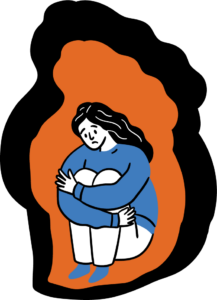
Physical symptoms:
- Panic attacks.
- Muscle tension and restlessness.
- Fatigue, sleep troubles.
- Digestive issues like nausea or diarrhea.
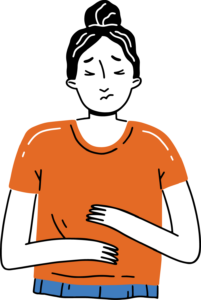
Behavioral changes:
- Avoiding situations, places, or activities that trigger anxiety.
- Needing constant reassurance.
- Procrastinating or struggling to complete tasks due to anxiety.
- Irritability, impatience, or difficulty managing emotions.
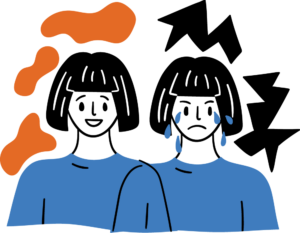
Social struggles:
- Major distress or difficulty functioning in social, work, or other important areas.
- Trouble forming or maintaining relationships.
- Avoiding social situations or public places.
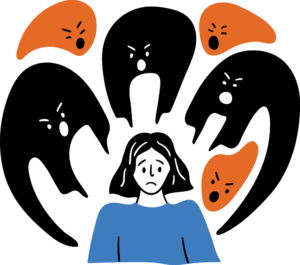
Physiological symptoms:
- Increased heart rate, blood pressure, and breathing.
- Sweating, trembling, and muscle tension.
- Feeling lightheaded or dizzy
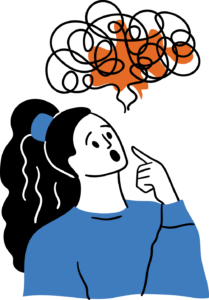
The connection between addiction and anxiety
Research shows that people with anxiety disorders are twice as likely to develop substance use disorders, often turning to drugs or alcohol to cope with their symptoms. This connection between anxiety and substance use disorder is well-established, but the reasons behind it are still being uncovered.
Current studies suggest a complex interplay between neurobiology, psychology, and social factors. For example, anxiety can lead to changes in brain chemistry that make substance use more appealing, while social stressors and personal experiences can amplify both conditions. Once someone starts using substances to manage anxiety, it can quickly become a cycle—substance use temporarily eases anxiety but often makes it worse in the long run, leading to more use and deeper substance use disorder.
Treating co-occurring disorders with MAT
When substance use disorder and anxiety happen together, treating both at the same time is key. Ignoring one can make it harder to recover from the other.
Medication-assisted treatment (MAT) is a major part of recovery for opioid use disorder. Medications like Suboxone help reduce cravings and ease withdrawal symptoms. These medications stabilize brain chemistry, making it easier for people to focus on recovery. But MAT is mostly for treating substance use disorder, not anxiety.
MAT can, however, have indirect benefits for anxiety. Some studies show that people using buprenorphine, the active ingredient in Suboxone, report feeling less depressed. Other research shows that people using suboxone are more socially connected, and generally have a better quality of life. This might be because MAT helps reduce the stress and chaos that often fuel both substance use disorder and anxiety.
Anxiety itself is best treated with behavioral therapies like cognitive-behavioral therapy (CBT) and dialectical behavior therapy (DBT). These therapies focus on the root causes of anxiety and teach practical ways to manage it.
Recent research also suggests that integrated treatment, which combines MAT with behavioral therapies, is especially effective for people with both substance use disorder and anxiety. The integrated, whole-health approach recognizes that these issues are tangled up together and need to be tackled as a pair. Whole-health treatment not only improves mental health but also cuts down on substance use and boosts the chances of long-term recovery.
The use of benzodiazepines for anxiety
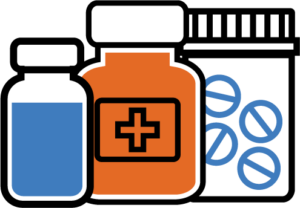
Benzodiazepines like Xanax and Valium are commonly prescribed for anxiety, but when combined with buprenorphine for opioid substance use disorder treatment, they come with some risks.
A recent study looked at how benzodiazepine use affects those in buprenorphine treatment. The study found that having a benzodiazepine prescription didn’t impact whether people stayed in treatment or used illicit opioids. However, there were some red flags: patients with a benzodiazepine prescription had more frequent visits to the emergency room, and the odds of accidental injury were higher—especially for women. There was no increase in overdose risk tied to benzodiazepine use, but the link to injuries can’t be ignored.
So, while benzodiazepines don’t seem to mess with the effectiveness of opioid treatment, they do raise safety concerns. Doctors need to carefully consider these risks, especially for women, and might need to explore other options for treating anxiety in patients on buprenorphine.
The importance of treating co-occurring disorders
Addiction and anxiety are often linked, and treating them both takes more than just medication. While Suboxone helps with substance use disorder, addressing anxiety at the same time involves using evidence-based therapies and tailoring the treatment to the individual.
Treating both conditions together is key. Focusing on just one can leave you vulnerable to setbacks. By addressing both, you strengthen the chances for lasting recovery.
Whole-health treatment starts here
If you’re struggling with both substance use disorder and anxiety, it can feel like your anxiety gets overlooked. Finding the right treatment shouldn’t add to that feeling. Look for a provider who sees the whole picture and treats both issues together. A whole-health approach—one that includes medication, counseling, community support, and both responsive care and mental health care—can make a real difference.
At Better Life Partners, we get it. Real recovery means treating your substance use and mental health together, so you can start to move beyond addiction.
Give us a call at (866) 679-0831 or request a follow-up call, and let’s build a plan that works for you.








